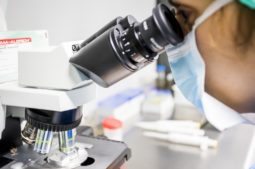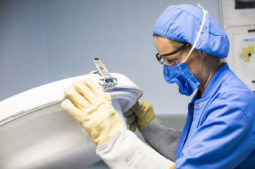Role of progesterone is decisive for every woman who wants to get pregnant. Progesterone is one of the naturally occurring hormones that help to regulate many bodily processes. The most important progesterone function in females is the menstrual cycle, helping to support a healthy pregnancy. Progesterone is a sex hormone, one of the main two affecting females, along with estrogen. Both hormones occur naturally. However, their levels can become unbalanced. Supplements administered in a variety of ways can achieve to restore the right concentration.
In this article, we will look at the role of progesterone and its impact on the menstrual cycle, fertility and pregnancy. We will also examine how progesterone is produced, both naturally and synthetically. We’ll see also how progesterone supplements can impact on fertility. This includes a brief look at some ground-breaking research carried out by a team from IVI which has taken major steps forward in elevating our already high success levels in the field of In Vitro Fertilization (IVF).
What is the role of progesterone?
Progesterone is mainly produced by the corpus luteum. This is what’s left of the egg follicle after it has burst open and released a mature egg at the point in the menstrual cycle in which ovulation occurs. There is more. It still has an important role to play during early and later pregnancy and preparing for childbirth.
Progesterone and the menstrual cycle
During your fertile years, the menstrual cycle starts off with the pituitary gland in the brain producing follicle-stimulating hormone (FSH) and luteinizing hormone (LH). These stimulate a new egg to become mature. As the follicle develops, it produces both progesterone and estrogen. They both cause a thickening of the womb lining, the endometrium, to prepare for receiving a fertilized embryo.
When the egg eventually emerges from its ovarian follicle during ovulation, the open follicle turns into a corpus luteum which becomes a temporary gland and produces more progesterone itself. This further thickens the endometrium to the optimum thickness for reception of a fertilized egg. If there is no fertilized egg, the levels of progesterone decrease. This causes the breakdown of the endometrium in menstrual bleeding, and another cycle begins. If progesterone levels are too low, it could cause problems with ovulation, conception, or the maintenance of a healthy pregnancy.
Progesterone and pregnancy
If, however, there is a fertilized egg, progesterone stimulates growth of the blood vessels that supply the endometrium, as well as the glands in the endometrium that deliver nutrients to the early embryo. This helps prepare the womb lining for implantation of the embryo. It continues then to maintain the endometrium throughout the pregnancy. In the early stages, progesterone is still supplied by the corpus luteum and is essential for establishing the placenta. As the pregnancy develops, the placenta takes over progesterone production at around six to eight weeks. The hormone continues to play an important role throughout the pregnancy in fetal development and in preparing the body for labor and childbirth.
How is progesterone produced?
We have seen that when the delicate balance of hormones that regulates the menstrual cycle is working well, the body looks after its own progesterone supply. But what about a scenario where the balance becomes disrupted, having a detrimental impact on a woman’s fertility and her body’s ability to see a pregnancy successfully through to full term? Happily, in many cases, progesterone supplements can restore the balance and help with both fertility and pregnancy.
Progesterone supplements and fertility
If your progesterone levels are low, you may experience symptoms such as mood swings, headaches and an irregular menstrual cycle. It could also cause irregular or absent periods, indicating poorly functioning ovaries. A simple blood test can show whether your levels are too low, and a progesterone supplement may be necessary. This could come in the form of:
- Gels or creams, applied topically or vaginally
- Suppositories, the most common form of treatment for low progesterone that is causing fertility problems
- Oral medication.
The increase in progesterone levels thanks to this type of therapy could help to thicken your uterus lining, increasing the chances of a fertilized egg implanting successfully and a subsequent healthy pregnancy.
Progesterone supplements and pregnancy
The jury is still out on whether progesterone supplements in early pregnancy are beneficial. Some authorities believe that supplementation can help to prevent early miscarriage. Others say there is no evidence to support this claim. There is however some evidence that, at the later stages of pregnancy, progesterone supplements can help to prevent premature or pre-term labour. For women with cervical shortening, third-trimester progesterone supplements are effective in the prevention of premature labour.
It is also clear that progesterone supplementation is an important factor in creating the right conditions for the embryo to implant in the uterus during IVF treatment.
IVI research into role of progesterone
A piece of research by Dr. Elena Labarta, a gynaecologist with IVI, has highlighted how important having right levels of progesterone can be during pregnancy.
- Dr. Labarta and her research team had previously established that there is a minimum level of serum progesterone which should be present on transfer day. If levels are below this minimum, implantation and subsequent pregnancy rates fall quite dramatically.
- Practitioners had assumed that the standard amount given during routine IVF treatment was adequate for this purpose. However, the newer research found that some patients absorbed a lower than optimum amount into their bloodstream, despite the standard medication being delivered.
- This demonstrated that absorption rates vary between patients. Also, if we identify the exact amount needed by a patient on an individual, case-by-case basis, we can ensure exactly the right level of progesterone. This will result in better success rates and will make a really significant impact within the world of fertility treatment.
Find out more
You can read more about our research into progesterone levels or look up our independently audited success rates. You can also contact us using our online form if you would like to discuss your own fertility options.





Comments are closed here.